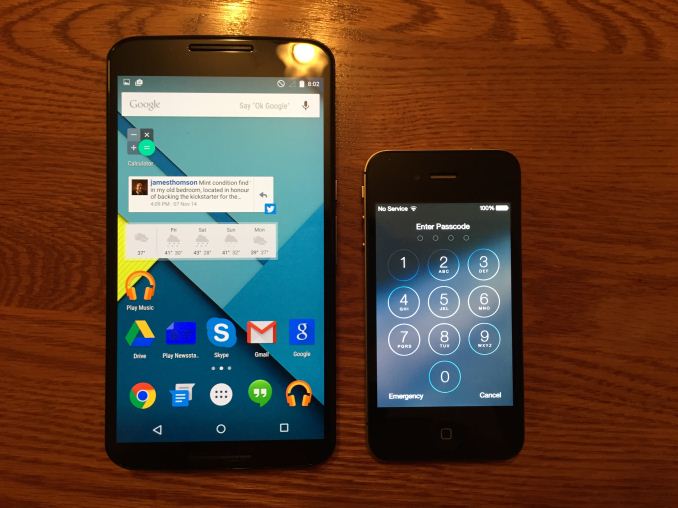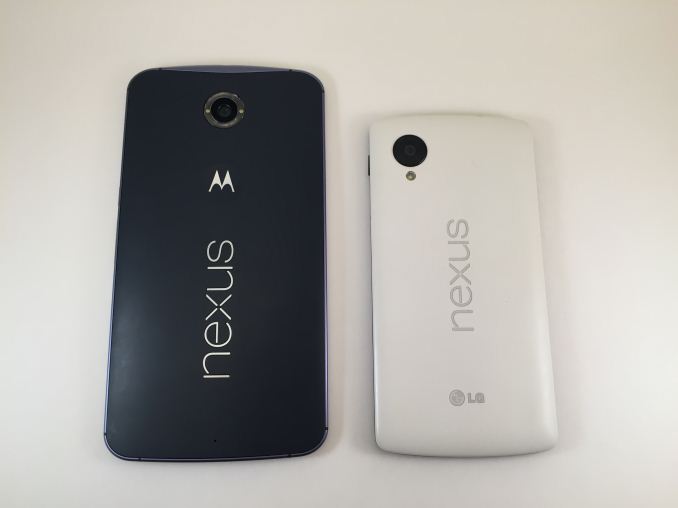The Nexus 6 Review
by Brandon Chester on November 12, 2014 1:00 PM ESTFinal Words
When I started reviewing the Nexus 6 I was very apprehensive. Not because I worried that it would be a bad device, but because I had never used such a large phone before. We have come a long way from the days where a 3.5" was considered huge for a phone. However, I had previously owned an iPad Mini and while the Nexus 6 was not that large, it helped me to think of ways I could use it that expanded beyond how I would typically use a smaller smartphone. At 5.96", the Nexus 6 provides an enormous window into all of your content, and allows you to freely do things like view desktop web pages and edit documents without the cramped feeling that arises when doing the same tasks on a smaller device like the Nexus 5 or the HTC One (M7). This also comes with downsides like the loss of single handed usability. The choice between a larger or smaller smartphone will obviously involve tradeoffs, but these do not necessarily make a certain size better than others. What I can say is that the Nexus 6 offered a very different experience from the devices in the 4.7" to 5" range that I was used to.
I think users that are interested in watching many videos on their device will be happy with the Nexus 6. Although stock Android unfortunately does not have a dedicated video application, Google Play is home to some of the best video players for mobile devices. After overcoming some compatibility issues with Android Lollipop, I was able to enjoy some of the best movie watching experiences I have had on a mobile device. Although the poor display calibration does negatively impact some media, films with a heavy use of black and dark colors like The Dark Knight look amazing on the 5.96" AMOLED display. I might even go so far as to say that for certain content the Nexus 6 provides an even better video experience than a tablet with a less extreme aspect ratio and an LCD display like the Nexus 9 or the iPad Mini.
Although the Nexus 6 is an additional device in Google's lineup, and fulfills a new role as a device, it's still going to be compared to the Nexus 5 purely due to its name and the timing of its release. I don't think that buyers will really need to decide between the Nexus 5 and Nexus 6, as they play in completely different markets and fulfill different roles. A user who wants a phablet won't be content with the Nexus 5, and conversely someone who wants a one-handed device won't like the Nexus 6. The Nexus 6 is better compared to other phablets like Samsung's recently released Galaxy Note 4 which shares many of the same specifications and is roughly the same price. I think that Samsung currently offers a better phablet experience with regards to software, with multi-window views, specialized landscape layouts, and S Pen integration. The display and battery life are also better on the Galaxy Note 4. The Nexus 6 has its own advantages as well, namely its build quality and guaranteed software updates. I don't think I can definitively say that one is better than the other, as they both have strengths and weaknesses which will make one more appealing to a user than the other based on what that user wants in a phablet. The Nexus 6 definitely leans strongly towards the phone side of the phablet equation though, which could be a bit disappointing for those that are looking for more.
Price is also a consideration with the Nexus 6. At $649 it represents a new style of premium pricing for Google's flagship device, and it means that the Nexus phone now competes with other flagship phones in every regard. After taking in everything that the Nexus 6 is, and everything it isn't, it's hard to come to a conclusion about if it meets the expectations set by its price tag. On the software side there are currently some issues with animation performance, but as a Nexus device you'll always get the latest updates and any future performance fixes will arrive as soon as possible. On the hardware side it sports great build quality, a camera which is greatly improved from the Nexus 5, a sharp display, and performance which is essentially the best that you'll find in an Android phone. But it's not without its issues, namely the poor display calibration and lower battery life than its competition. My need for a well calibrated display means that I personally think that Google may have aimed just a bit too high with their price point. However, anyone who isn't as bothered by the wider gamut and relative color inaccuracy should definitely feel comfortable paying the premium price that Google is asking.
Overall, I think that Google and Motorola have built a solid device. It isn't without its issues, but there's a lot to like, even if you're someone who has never used a phablet before. I had always been somewhat of a skeptic regarding massive phones; I didn't understand the appeal. But after using one, I can see how having a massive display to view all your content can be really beneficial by enabling forms of productivity that simply can't be done comfortably on smaller devices, and by making activities like viewing photos and watching videos significantly more engrossing. Not only did it change my mind about the appeal of phablets, it also changed my mind about Google's ability to compete in the premium device segment of the market. The Nexus 6 holds its own against all the other high end devices that we've seen released this year, although the Galaxy Note 4 with its more phablet oriented software features and hardware advantages might be a better device overall. But those who want a large device and value having software support directly from Google won't be disappointed by the Nexus 6.












136 Comments
View All Comments
tuxRoller - Wednesday, November 12, 2014 - link
Google really screwed up this years nexus devices.They are what I always buy, so now I'm left in a bit of a lurch.
Probably will wait for the 64bit transition next (snapdragon 810, or exynos 7, though I'd prefer to avoid img gpus).
hpglow - Wednesday, November 12, 2014 - link
I'm a little taken back by the poor battery life compared to the note 4. The screen is a little larger but damn.modulusshift - Wednesday, November 12, 2014 - link
Hey, can we please get a storage benchmark on this? Ars claims it has big problems, is that a memory supplier issue? Thank you!jaysns - Wednesday, November 12, 2014 - link
Apparently there is a huge performance hit when switching on encryption on the Nexus 5 http://www.reddit.com/r/nexus6/comments/2m4jra/une...Can only hope this is a bug as this will pretty dramatically affect how the device performs.
1032724311 - Wednesday, November 12, 2014 - link
系统还是原来是原生系统 可终端设备已经不是原来的nexus的味道了spikebike - Thursday, November 13, 2014 - link
So for twice the money (or so) of the nexus 5 we get a phone that loses many benchmarks (battery life, cpu, brightness, saturation) to the nexus 5. What's worse is that the nexus 5 was already trailing in battery life to begin with.Here's hoping google adopts some of the better phones into the GPE program.
Nevod - Thursday, November 13, 2014 - link
What seems to be most strange is the really poor battery life. Note 4 has just a bit smaller screen (10% difference only) yet more than 50% longer life. The cause isn't obvious, they both have AMOLED screens of same resolution, exactly same battery capacity and similar performance. The only differences are SoC (I get that it's the most important thing, but modern SoCs aren't that different in efficiency IIRC) and perhaps screen quality. When Galaxy Nexus came out, it had screen ahead of everyone else - but it was immature and extremely power hungry, paired with an already outdated SoC which GPU was overloaded with screen's resolution it had really poor battery life in browsing. Displays advanced and soon even screens with much smaller pitch were more efficient, processes shrank and GPUs consumed modest power on higher resolutions.Here, however, everything is nearly identical to Note 4. What is the cause of such a difference? Is the screen on N6 really is such a power hog (who's the supplier, anyway? Samsung, I suppose?). Though even the screen itself shouldn't be so problematic. Is the Exynos, and Mali in particular so much more efficient? Unlikely. I do think that this is caused by software, as seemingly it was with most Nexus phones - they were never really good at battery life. Even the Lollipop doesn't seem to help that.
darkich - Thursday, November 13, 2014 - link
Yeah,on top of all that, Lollipop is said to make HUGE power efficiency gains over KitKat.So this story is a major upset to some MYTHS.
What happened with pure, clean Android (supposedly more efficient), and the bloated, messy Samsung ROM (supposedly less efficient)?
If the myths are true, Note 4 with Lollipop should have ridiculously better efficiency than this, on basically equal hardware.
darkich - Thursday, November 13, 2014 - link
Oh and btw, the Samsung Note 4 ROM is vastly better than this.Besides offering the richest possible multitasking options, and all the S Pen extras, it actually makes one handed use easily possible.
This aspect keeps on getting ignored in the reviews just because reviewers arent even thinking about using it.
I ignored the one handed option too for months on my Note 3, but slowly it sank in, and now I see it as an essential piece of any proper phablet software.
Nevod - Thursday, November 13, 2014 - link
I've re-read battery and display parts of Nexus 6 and Note 4 reviews and now I think I do get it. Looks like Nexus 6 indeed has a problematic screen, like the Galaxy Nexus had before - it has way too high power consumption and low max brightness. However, that by itself shouldn't cause too much of a problem in real use (unless you are typically browsing in direct sunlight).Battery life test is done at 200 nits, almost the max of 250 nits for Nexus 6. GNex at that brightness level had some serious power consumption from display alone, well over 1 watt, so screen's power consumption dominates the test done like that. IRL, you don't just load the page over and over, with modest CPU and GPU load, you actually scroll a lot, seriously loading GPU - you actually scroll way more than you do anything else, so RL web browsing life is dominated by GPU power consumption, as the screen is usually running at low brightness level and it's contribution to power consumption isn't that big.
So, I suppose, while for sure Nexus 6 will have less battery life than Note 4 due to crappy screen tech, in real life, there shouldn't be too much of a difference, probably around 10%, 15% at most.